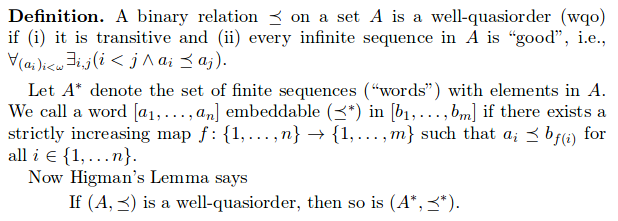Subword Sequence
Suppose we have two words written in the standard English alphabet, and . is a subword of , if some letters from can be deleted to obtain . For example, man is a subword of ma rti n , abb is a subword of a c b a b but cab is not a subword of bac kward.
True or False: In any infinite sequence of words, there are two words and such that is a subword of
For the purpose of this question, assume that a word is any finite sequence of letters from the English alphabet.
This section requires Javascript.
You are seeing this because something didn't load right. We suggest you, (a) try
refreshing the page, (b) enabling javascript if it is disabled on your browser and,
finally, (c)
loading the
non-javascript version of this page
. We're sorry about the hassle.

(Answering "in every infinite sequence of distinct words , each of finite length and solely composed of symbols from the standard English alphabet, is it possible to always find a a word and b a subword of a ?")
Let s be any lexicographically ordered sequence of infinitely many words (each of finite length).
First off, because there is a finite amount of symbols in the standard English alphabet (there are 26 letters), it can be said that s will necessarily run out of choices and will eventually have to come up with longer and longer words as we iterate over it.
Letting b be any word in s , and n be the length of b , we find that b can only be one in
26^npossibile words.Considering this, it will only take
26^nnew words for s to spit out a (any superword of b ). Therfore, s will necessarily contain a word and one of its subwords.